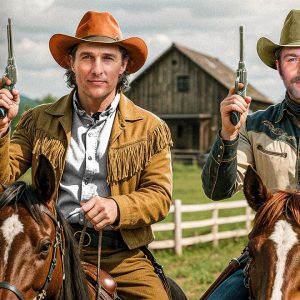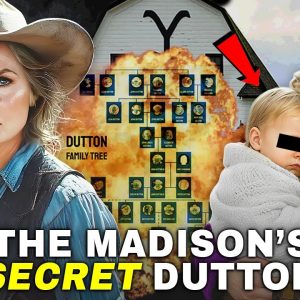In the ever-expanding world of Yellowstone, Taylor Sheridan has never been content to simply spin the wheel. Instead, he moves like a grandmaster, shifting characters and genres with surgical precision. And with Why Marshalls, what initially appeared to be a gritty spin-off is proving to be the most radical departure—and possibly the boldest chapter—in the Dutton saga yet. At its core is Case Dutton, a man forged in fire, trauma, and family legacy, now stepping beyond the ranch and into a crucible that could redefine not just himself, but the very DNA of Sheridan’s universe.
Forget the wide-open Montana skies. Why Marshalls trades sprawling landscapes for tight corridors, tense shootouts, and the kind of law where morality is a luxury. The setting has shifted—possibly to the cartel-controlled borders of Texas or the lawless outskirts of the American Southwest—but the stakes have never been higher. Case isn’t just leaving home; he’s being deployed into a warzone—one where justice is dirty, truth is weaponized, and survival demands sacrifice.
And here lies the heart of Sheridan’s storytelling genius: Why Marshalls doesn’t just reposition a character, it rips him out of his roots. For years, Case Dutton has existed in a brutal dance between duty and loyalty. On the Yellowstone Ranch, he was the quiet executioner—a man who followed orders from his father, bore the scars of his family’s sins, and carried the weight of a legacy he never fully embraced. But now? There’s no ranch to protect. No family name to shield him. All he has is a badge—and it doesn’t come with a code.
The emotional stakes are staggering. Case’s new mission, sanctioned by the U.S. government, is more than a shift in occupation; it’s a psychological reckoning. He’s tasked with hunting men who operate outside the law, but the true challenge is whether he can stay within it himself. The deeper he descends into the murky world of federal enforcement, the more blurred the line becomes between duty and vengeance. Case, once guided by instinct and a cowboy’s moral compass, must now navigate a system built on compromise, secrets, and the occasional necessary lie.
And that transformation doesn’t come without cost. What happens when a man raised to protect starts to pursue? When the one who hesitated before pulling the trigger becomes someone who doesn’t flinch? Sheridan uses this shift to explore a brutal question: How much of yourself can you lose before there’s nothing left to come home to? If Yellowstone was about defending legacy, Why Marshalls is about deconstructing identity—breaking a man down to his core and asking if there’s anything worth rebuilding.
This evolution is echoed not just in Case’s character arc, but in the series’ entire aesthetic. Gone are the golden-hour vistas and poetic silence of the ranch. Why Marshalls swaps in noir-tinged tension, dimly lit motel rooms, and lawmen who are just as haunted as the criminals they chase. Think True Detective meets Sicario, with a cowboy soul lurking somewhere beneath the surface. This is Sheridan’s boldest tonal experiment yet—infusing procedural drama with psychological weight and western grit.
Yet it’s not just atmosphere that makes this series transformative—it’s what it reveals. As the plot unfolds, hints of a deeper conspiracy emerge. Case’s orders may seem clear on paper, but behind every assignment lies a hidden agenda. Is he being used as a pawn in a larger game of federal control? Is someone pulling strings not just to deploy him, but to break him? With every mission, every morally complex decision, Case edges closer to a truth that could unravel everything—not just his own sense of self, but the Dutton mythos as we know it.
And therein lies Sheridan’s masterstroke.
Why Marshalls doesn’t operate in a vacuum. Like 1883, 1923, and Yellowstone, it feeds into a larger narrative tapestry—one that spans decades, borders, and bloodlines. But what makes this series unique is its role as a possible pivot point. By turning Case Dutton into a symbol of systemic reckoning rather than ranch survival, Sheridan positions Why Marshalls not as a side story, but as the next cornerstone of his empire.

It begs the question: what if this isn’t just about Case’s journey? What if Sheridan is laying the groundwork for something even larger—an interlocking universe where the lines between family, government, and morality continue to blur? If Yellowstone was the myth of the American West, Why Marshalls might be the myth of American justice—flawed, gray, and violently transformative.
And it’s not just the fans who are at risk of underestimating it. Within the show, every relationship Case builds—or burns—has ripple effects. What happens when a man raised to distrust authority becomes its deadliest instrument? How does his absence from the Dutton fold affect those still holding the line? Can his wife Monica stand by him when the man who returns is no longer the man who left? These are the emotional landmines that Why Marshalls scatters along its path.
As the show progresses, one thing becomes clear: Case Dutton isn’t chasing criminals. He’s chasing answers. About justice. About identity. About whether the man you become to protect your family is someone that family would even recognize. And maybe, most powerfully, about whether legacy is worth preserving if it means losing your soul.
Sheridan has always been a long-game writer. Where others see spin-offs, he sees chessboards. And if Why Marshalls is the next move, you can bet the king is on its way. Every decision Case makes, every bullet fired, every law bent—it’s all part of something bigger. A narrative reckoning. A mythic evolution. A new kind of western where the hero doesn’t ride off into the sunset… he disappears into the shadows, with a badge, a burden, and no clear way back.
So saddle up. The frontier isn’t what it used to be. And neither is Case Dutton.





